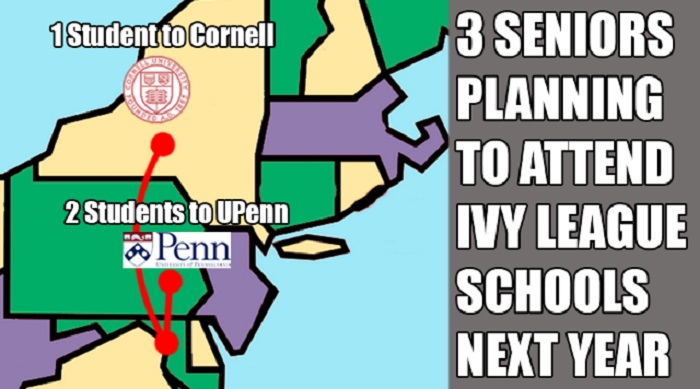3 Seniors Planning to Attend Ivy League Schools, Some First in Families
Seniors Emily Huynh, Leo Wagner and Kyle Pico have recently been admitted to Ivy League universities, University of Pennsylvania and Cornell University.
February 25, 2019
Seniors Emily Huynh, Leo Wagner and Kyle Pico have recently been admitted to Ivy League universities — both Huynh and Wagner were admitted to the University of Pennsylvania (UPenn) and Pico was admitted to Cornell University. Some seniors, including Pico and Huynh, are the first in their families to attend college, or have family members who endured hardships earlier in their lives, making the Ivy League acceptance all the more special, they said.
Ivy League universities are generally considered to be among the best higher learning institutions in the world, notable for their challenging academics, extremely selective admissions standards and prestigious standings among other universities. Admission to any of these colleges is the goal of many high school students nationally– the same was true for the RHS seniors who have been admitted.
“I was fascinated with the idea of going to Cornell since my underclassmen years,” Pico said. “Given my family’s history of having heart problems, I wanted to study pre-med in college. I did a ton of research and found that Cornell is an excellent school for their pre-med program, and also contributed to my interest of being surrounded by nature.”
Pico is among the first in his family to enroll in a university.
“My mom never went to college, and my sister went straight to Montgomery College,” Pico said. “As a freshman, I was wondering what I wanted to do with my life. I made a plan for Cornell and executed it.”
Huynh shares a similar story. At RHS, she stayed committed to a few clubs, including Echoes, the Class of 2019 SGA and the varsity basketball team, all of which contributed to her acceptance to UPenn. Being the daughter of Vietnamese immigrants helped her in her academic pursuits, she said.
“My parents came from nothing – they immigrated to the U.S. from Vietnam and had only a few hundred dollars in their pockets and no place to live,” Huynh said. “Now, they’re successful business owners here. They taught me that almost anything is possible and inspired me to work as hard as I could to reach my goals.”
Students aiming to attend an Ivy League must be prepared to work extremely hard, achieving top grades and test scores while balancing various extracurricular activities.
“In my view, school comes first over nearly everything. If I don’t understand something at first, I make sure to keep practicing the skill or looking over my notes until I understand the concept,” Wagner said. “I also have a very good study routine and hold leadership positions in several academic clubs. I think thriving at any college is going to be very hard if you’ve coasted by doing the bare minimum throughout high school.”
The average GPA for admitted students at the UPenn is a 3.9 on the 4.0 scale and their average admitted SAT score is a 1490, according to college statistics site CollegeSimply. At Cornell, the average admitted SAT score is a 1470, and the school does not report its average admitted GPA.
Meaningful extracurricular activities are critical for admission to selective universities like UPenn and Cornell. Having extracurriculars that showcase one’s passions and leadership abilities will be of great help to their college applications, according to college preparation site PrepScholar. Pico, Wagner and Huynh all had various extracurriculars, including class office, debate team, Echoes Literary Magazine and school sports teams, among others.
Pico has advice for underclassmen who wish to be accepted to prestigious universities.
“If you plan on getting into a prestigious college, make a plan and execute,” Pico said. “It really is all about you and admissions officers are looking at what you can contribute to their school. Having the initiative to be a part of extracurriculars, studying in the classroom and for standardized tests, and making real change in your community is very important.”





